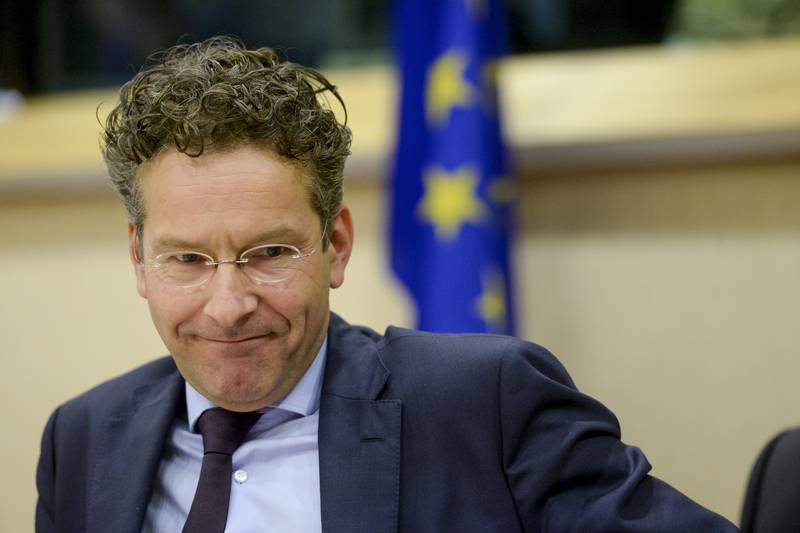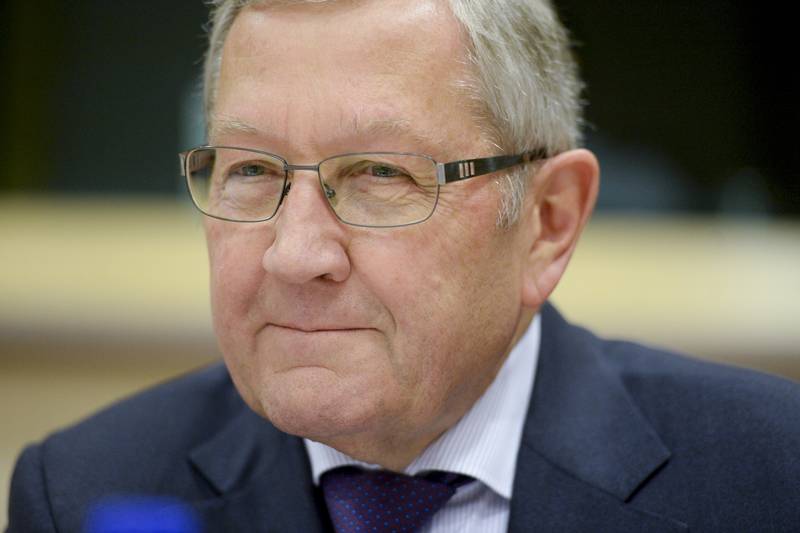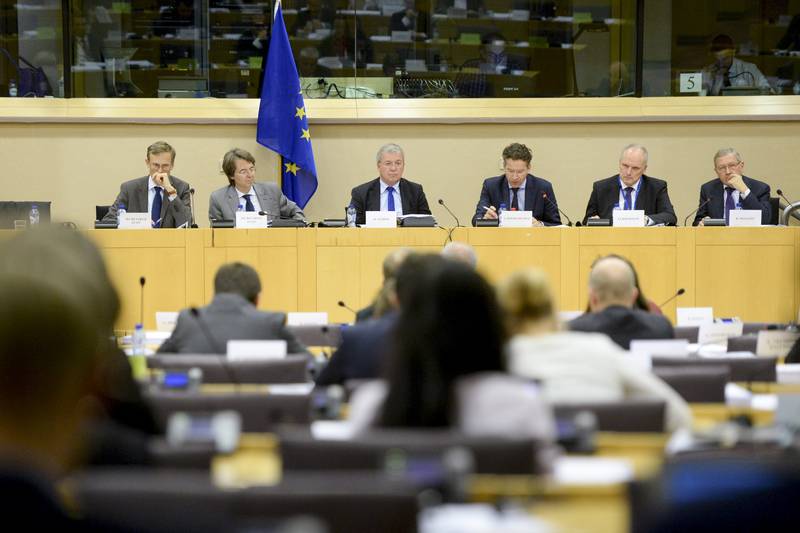A Clash between EP and Eurogroup Chief over Greece
Adelina Marini, November 12, 2015
 The first discussion of the third bailout programme for Greece was scheduled to commence in the late afternoon of November 10th in the European Parliament’s economic committee with the participation of Eurogroup leader Jeroen Dijsselbloem (the Netherlands, Socialists and Democrats) and the boss of the permanent bailout fund (European Stability Mechanism) of the euro area, Klaus Regling. However, it turned into a violent quarrel between the two leaders and MEPs over the European Parliament’s involvement in the oversight of implementation of the Greek bailout plan. The EP has been calling for a long time for such a discussion, but to no avail. The reason this issue was raised once more by MEPs is a letter from Greek PM Alexis Tsipras to EP President Martin Schulz (Socialists and Democrats, Germany) from August of this year, in which he asked that the EP was included in the regular reviews of the programme’s implementation. Alas, Jeroen Dijsselbloem and Klaus Regling were unyielding and you could say that the European Parliament lost this battle again.
The first discussion of the third bailout programme for Greece was scheduled to commence in the late afternoon of November 10th in the European Parliament’s economic committee with the participation of Eurogroup leader Jeroen Dijsselbloem (the Netherlands, Socialists and Democrats) and the boss of the permanent bailout fund (European Stability Mechanism) of the euro area, Klaus Regling. However, it turned into a violent quarrel between the two leaders and MEPs over the European Parliament’s involvement in the oversight of implementation of the Greek bailout plan. The EP has been calling for a long time for such a discussion, but to no avail. The reason this issue was raised once more by MEPs is a letter from Greek PM Alexis Tsipras to EP President Martin Schulz (Socialists and Democrats, Germany) from August of this year, in which he asked that the EP was included in the regular reviews of the programme’s implementation. Alas, Jeroen Dijsselbloem and Klaus Regling were unyielding and you could say that the European Parliament lost this battle again.
Moreover, the two of them grounded some of the hawks in the EP’s economic committee by showing them exactly where they stand. During the negotiation of key European legislation for dealing with the crisis in the euro area the influence of the EP and especially of this committee rose significantly. Regarding Greece, however, legal base is not on the MEPs side. Jeroen Dijsselbloem not only discarded the accusations of lack of democratic accountability on the Greek bailout programme, but also supported intergovernmental approach (agreements among member states outside European law).
According to the Dutch minister of finance, the political decisions made in the Eurogroup are subject to supervision by national parliaments, which does not mean that the European Parliament should be neglected. On the contrary, he said that the EP must be duly informed. Mr Dijsselbloem reminded that the institution’s rights were written down in European legislation, but regardless of that his appearance at the hearing was a signal that he supports the wish of the EP for more active involvement. It could go as far as having such dialogues, but nothing more, because in the Treaty for the establishment of the European Stability Mechanism (ESM) negotiations and supervision of implementation are assigned to the European Commission. There are provisions for consultations with the European Central Bank and, when necessary, with the International Monetary Fund.
ESM boss Klaus Regling (Germany) fully backed Jeroen Dijsselbloem and reminded that in the legal sense the fund is not part of the European Union, meaning it has no formal relationship with the EP. The reason for this is that when this fund was being created, as well as its temporary predecessor, the EFSF, there was no time for alterations of the Treaty of Lisbon. He assured that the ESM is a subject to strict political control, practised by member states. This includes national parliaments, which have very large influence in some countries on the formation of the respective minister of finance’s position. The board of governors of the fund consists of the ministers of finance of the euro area, each of whom is democratically elected. “So democracy is really in the ESM’s DNA”, assured the German.
This did nothing to convince the committee’s members who asked for more rights. Left-wing MEP Elisa Ferreira (Portugal) stated that it was strange that in Europe such a huge European problem like Greece is addressed with no accountability to the EP and that the intergovernmental method is preferred to the community one. The EP has long protested against the intergovernmental approach in negotiating and insists that the community one is used, but this is not always possible, as it was clearly seen in the creation of the single bank resolution mechanism (SRM). Jeroen Dijsselbloem replied that the intergovernmental framework is a given fact. “I can’t change it, certainly not in the short run”, he said and explained that this would require changing of treaties, which would be quite a difficult debate at present. Ms Ferreira reminded him, that if something needed to be change it was just the Treaty for the ESM, but the Dutch minister of finance did not budge.
 Klaus Regling was more agreeable and stated full support for including the ESM in the founding treaties of the EU, but, in his words, this would take some time. The two bosses’ replies enraged MEPs further. One of the most prominent members of the economic committee, Sylvie Goulard (ALDE, France), expressed her puzzlement by their words, which she read as denying cooperation. She underlined that the question of accountability in front of the EP was not a power struggle. It is about guaranteeing trans-border debate and common interest vision. She got mad at Dijsselbloem’s words that he cannot change anything at the moment and reminded him of President Obama’s slogan from his first campaign “Yes, we can” and urged him to work in two directions. One is using article 18 of the two-pack (a relatively new legislation on euro area governance), where power is granted to the EP to invite representatives of the Council and the Commission for dialogue.
Klaus Regling was more agreeable and stated full support for including the ESM in the founding treaties of the EU, but, in his words, this would take some time. The two bosses’ replies enraged MEPs further. One of the most prominent members of the economic committee, Sylvie Goulard (ALDE, France), expressed her puzzlement by their words, which she read as denying cooperation. She underlined that the question of accountability in front of the EP was not a power struggle. It is about guaranteeing trans-border debate and common interest vision. She got mad at Dijsselbloem’s words that he cannot change anything at the moment and reminded him of President Obama’s slogan from his first campaign “Yes, we can” and urged him to work in two directions. One is using article 18 of the two-pack (a relatively new legislation on euro area governance), where power is granted to the EP to invite representatives of the Council and the Commission for dialogue.
You are not doing anything illegal, she assured. The other thing that Ms Goulard requested is for Dijsselbloem to insist on “real accountability”, which is not aimed at national parliaments. “No national parliament, even the strongest ones, can give its backing for the creditors and the southern countries at the same time”. She urged him not to underestimate euroscepticism and the citizens’ lack of trust. The Eurogroup boss was hardly impressed by the emotional outburst of the French MEP and said that he sees nothing bad in intergovernmentalism. In the end of the day this is how the EU was incepted. “So, for me there’s no taboo on that”, he said completely honestly and firmly rejected any suggestions that intergovernmental agreements are democratically illegitimate by default. If the EP did have competences on the ESM and bailout programmes, this would have hardly lowered euroscepticism, he said further.
Jeroen Dijsselbloem struck back by pointing out that the facts show a different reality. People feel much more represented at the local level, than in national parliament, and more in the national, than in the European one. Klaus Regling, who seemed in full sync with the Eurogroup president, pointed out in turn that it is true there is euroscepticism everywhere, but support for the euro is in fact growing. In the countries with programmes, especially Portugal and Greece, it is over 70%. “I think we should be a bit more careful with these judgements”. This did not quiet down the committee members, however. Another hawk, the Green Philippe Lamberts (Belgium) countered that there was a problem with debating such problems at the national level, in a national context, where national interest prevails. During the MEP’s speech the microphone caught Jeroen Dijsselbloem’s sigh, which showed his loss of patience, or possibly fatigue from his full-day participation in the Council of Finance Ministers and the meeting of the Eurogroup the previous evening, where the Greek bailout programme was the key issue.
Philippe Lamberts pointed out that the EP was the place where common interest can be discussed outside the national context. “In the Netherlands, you sing a Dutch song. Here, you sing a more European song. This is why actually we'd like to have a stronger role here. So, which Dijsselbloem do I have to believe?”, concluded the Belgian MEP. Despite his tiredness and possibly boredom, Jeroen Dijsselbloem launched a powerful counterattack, disagreeing with this statement. According to him, if only national interest prevailed in national parliaments, now there would not be any programmes and cheap loans for Greece. A verbal shootout commenced between the two of them  with Philippe Lamberts mentioning something about the saving of German banks and Jeroen Dijsselbloem replied he did not share his cynicism.
with Philippe Lamberts mentioning something about the saving of German banks and Jeroen Dijsselbloem replied he did not share his cynicism.
“Basically, what you're saying is that national parliaments are not capable of looking across their national borders. If that was the case we wouldn’t have built the Europe we have." The minister added that he appears twice a month in the Dutch parliament to discuss European issues, same as many of his Eurogroup colleagues. “Don’t dismiss that debate. That would be a wrong approach”, urged Mr Dijsselbloem.
Translated by Stanimir Stoev
 Federica Mogherini | © Council of the EU
Federica Mogherini | © Council of the EU | © Council of the EU
| © Council of the EU Luis De Guindos | © Council of the EU
Luis De Guindos | © Council of the EU